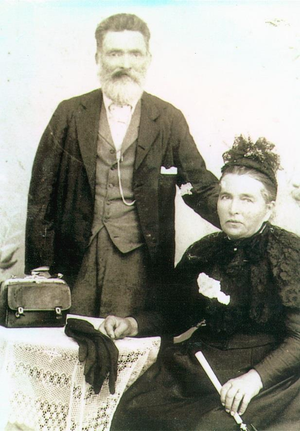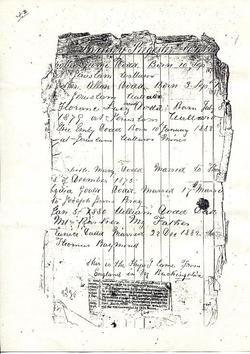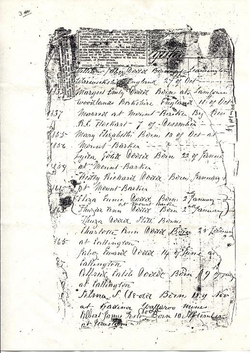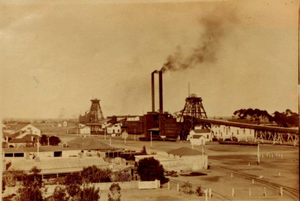|
The following genealogical essay was compiled by Gail Dodd ([email protected]) for her grandaughter, Layne and is reproduced here with her permission. It was taken from her research into her husband's Dodd and Champion families undertaken some 25 years ago (c1995). This is one of three of her essays which relate to Mount Barker being as follows: [ William and Mary Dodd ] [ their son William (Jabez) and his wife, Margaret (Emily) Dodd ] [ and Emily's parents, Richard and Elizabeth Champion ] |
Margaret (Emily) (nee Champion) & William (Jabez) Dodd
Grumpy’s Paternal Great-Great- Grandparents
 William Jabez, known as Jabez, was born at Leamington in Warwickshire on 27 October 1833, the eldest child of William Dodd and Mary Wallbank.
William Jabez, known as Jabez, was born at Leamington in Warwickshire on 27 October 1833, the eldest child of William Dodd and Mary Wallbank.
He was five years old when his family emigrated to South Australia and most of his youth and early manhood was spent around Mount Barker.
According to a newspaper report in the ‘Observer’ in 1911, Jabez could remember the laying of the foundation stone of Dunn’s flour mill at Mount Barker in 1844. John Dunn came to Mount Barker in January 1844 with Ridley’s famous stripper (a harvester that removed the heads of grain, with the threshing being done later by a separate machine). Dunn had also recently become the owner of the complete machinery for a steam flour mill ordered from England. The developers of Mount Barker saw a need for settlers of the newly surveyed 80-acre blocks to sell their wheat locally, so they offered Dunn free land in the town if he would build the mill there. Dunn accepted and his mill was working by August 1844. It was the first steam mill outside Adelaide and became the base mill for a milling empire than lasted 50 years.
The Dunn and the Dodd family were devout Primitive Methodists (Wesleyans). Indeed, Jabez became a lay Preacher. He called one of his diaries ‘Leaves in Life’ (1885 to 1910). In it he wrote about his early Christian life within ‘dear old Mount Barker’, his happy memories and his first sermon at nearby Echunga in March 1852. He recorded John Dunn’s burial at the Wesleyan Cemetery, Mount Barker and wrote that he was ‘one of my first Sunday School teachers and one who I shall always respect in time and Eternity. Many happy thoughts are brought to mind in connection with those youthful days. O the thought of meeting again in that heavenly home when life is passed away. In prayer meeting and class meetings of former days his experience was rich in Faith and they indeed, rich to me even now after nearly 50 years of trusting in the same Blessed Saviour.’
For many years Jabez earned his living as a teamster (carrier) on the roads between Mount Barker and Adelaide. In 1851, when gold was discovered in Victoria, he travelled overland to Bendigo where he remained for six months. When he returned to Mount Barker he bought some land and with his father ‘followed farming pursuits’ as well as continuing his work as a teamster.
Jabez married Margaret (Emily) Champion on 7 December 1855 at the Wesleyan Chapel, Mount Barker. Emily was the daughter of Richard and Elizabeth Champion (nee Cowley). She was born on 18 October 1837 at Lambourn Woodlands, a small village in the English county of Berkshire. The Champion family arrived in South Australia on 31 March 1850 aboard the ‘Trafalgar’ and also settled in the Mount Barker area.
South Australian Register, Adelaide 13 December 1855, p2
MARRIED. - At the Wesleyan Chapel, Mount Barker, on the 7th instant, by the Rev. R. C. Flockart, William Jabez, eldest son of Mr. William Dodd of Mount Barker, to Margaret Emily, second daughter of Mr. Richard Champion, of Mount Barker.

 On 3 September 1855, Emily’s mother, Elizabeth died of apoplexy. She was 44 years old and pregnant. Hannah, Elizabeth’s mother wrote a letter of condolence to her son-in-law but by the time it arrived in Australia, Emily’s father had remarried. Emily was badly affected by Richard’s sudden recovery from grief and his plan to bring a new wife into the home. So much so, that she brought her wedding date forward.
On 3 September 1855, Emily’s mother, Elizabeth died of apoplexy. She was 44 years old and pregnant. Hannah, Elizabeth’s mother wrote a letter of condolence to her son-in-law but by the time it arrived in Australia, Emily’s father had remarried. Emily was badly affected by Richard’s sudden recovery from grief and his plan to bring a new wife into the home. So much so, that she brought her wedding date forward.
Emily was 18 when she married 22-year-old Jabez on 7 December 1855. Remarkably they had 14 children! 1
The first five births were born at Mount Baker: Mary (Elizabeth) in 1856; Lydia in 1859; William (Hedley) in 1861; and twins Thuzar and Eliza in 1863. Sadly, Thuzar was stillborn.
The next three children were born at Callington, a copper mining town: Charlotte in 1865; Jabez Edward in 1867; and Alfred in 1869. The Mount Barker Wesleyan Church minutes mention that in 1868 Jabez was to take up an appointment at Dry Station, the nearest Primitive Methodist church to Callington at that time.
In 1869 Jabez moved his family to the Yorke Peninsula where copper mines had also recently been established. The last six children were born at Kadina and Wallaroo: Sarah Selina in 1871; James Albert (Foster) in 1873; Walter (George) in 1875; Arthur in 1877; Florence in 1879; and finally, Elsie in 1883.
When Elsie arrived, Emily was 46 years old and had been having children for 27 years!
Jabez was employed as an engine driver for the Wallaroo and Moonta Mining Company for a total of 34 years, working at the Kurilla Mine for 30 of those years, first as a miner, then as an engine driver. A family photograph of Wallaroo Mines taken around 1920 appears below.
 Jabez claimed his vote at Kadina and the 1878 Electoral Roll notes: William J Dodd - New Jerusalem. Jerusalem is a suburb in the town of Kadina.
Jabez claimed his vote at Kadina and the 1878 Electoral Roll notes: William J Dodd - New Jerusalem. Jerusalem is a suburb in the town of Kadina.
Jabez continued his mission as a local preacher in the Methodist Church for about 60 years. 2 He reminisced that in his early years ‘he walked many hundreds of miles to fill the pulpits of country churches of the Primitive Methodist Connexion in the Mount Barker circuit, and having settled at Kadina, frequently tramped to Moonta and other churches in the Kadina , Moonta and Wallaroo circuit to fulfil preaching engagements’. Oral history recalls that Jabez had no sense of direction and that his wife had to hang out a lantern to guide him home!
Jabez died in 1912, aged 79 years at his home in Jerusalem and he was buried at Kadina Cemetery. Emily passed away nine months later. A memorial window was installed at the Victoria Square Methodist Church by their children. Unfortunately, the church has since been demolished and the memorial window has been relocated to the Uniting Church Parish in Daw Park, but with the inscription covered.
The Advertiser (Adelaide, SA : 1889 - 1931) Friday 22 August 1913 p 8 Family Notices
Dodd – On the 15th August, at the residence of Mr. Alfred Dodd, of Lipson-avenue, Kadina, Margaret Emily, beloved wife of the late William Jabez Dodd, aged 76 years. Colonist of 65 years. At rest.
Australian Christian Commonwealth (SA) Friday 24 January 1913 p 8
JABEZ WILLIAM DODD.
In the translation of Jabez William Dodd, late of Kadina, the State has lost one of its worthy pioneers and Methodism a characteristic and valued son, whose worth and work are beyond human analysis and estimation. He was born at Leamington, Warwickshire, on October 27, 1833. He was brought by his father, the late Mr. Wm. Dodd, to South Australia in the ship ‘Buckinghamshire’ on March 22, 1839. For a few years his father resided in Adelaide, and then transferred to Mount Barker. He was one of the original trustees of the erstwhile Wesleyan Church there—his trusteeship dating back to 1857 [sic]. 3 His son, Jabez, the subject of this sketch, resided with his father at Mount Barker during the early and formative years of his life.
He was present at the laying of the foundation-stone of Dunn's historic flourmill. Varied and interesting were his many reminiscences of pioneer days. For about ten years he was engaged with his father in agricultural pursuits. Naturally he was amongst the many who were attracted by the Victorian gold diggings; but his experiences there were not the happiest, and he returned after an interval of six months.
For years he carted on the Mount Barker-Adelaide Road. Eventful and entertaining were his many stories of those early days of strenuous toil. The grit and gumption of the ‘motor men’ of the road that knew no Macadam, and very little of anyone else, read like romance today.
On November 11, 1851, during the ministry of the late Rev. Joseph Dare, in the house of Mr. George Millway at Littlehampton 4 , Wm. Jabez Dodd was converted to God. Two words suffice for the description of this change, viz., ‘new birth’; but it required a lifetime to demonstrate what it involved—no one who knew our Brother Dodd would gainsay it. Activity and aspiration—blessed twinship! were the first fruits of his conversion, and on March 13, when seventeen years of age, the call to service came. That day, accompanied by the late John Dunn, jun.—a dear friend of those early days—he preached his first sermon in the home of Mr. Mincham at Echunga. His text was: ‘For God so loved the world,’ etc. Dr. Burgess— then Rev. H. T. Burgess was also a valued friend and counsellor of those never-to-be-forgotten days. Mr. Dodd went to Yorke's Peninsula in 1869, and for thirty-five years was a valued servant of the Moonta and Wallaroo Mining Company. An old pastor and esteemed friend, Rev. J. H. Williams, writes:—'Jabez Dodd won my affection almost the first day I saw him. Forty-seven years have fled since then, but nothing has occurred to change my opinion or damp my affection. He was not a brilliant, but an intensely practical man. He studied the Scriptures assiduously and applied himself commendably to literature generally to equip himself for conscientious and capable work. He excelled as a class leader. For seven years I was his minister, but he was my class leader. They were happy days of fellowship and friendship. Would you know a man, know him in his home. Here he is untrammelled, natural, nothing assumed or strained, and is seen at his best and his worst. Jabez Dodd was an affectionate and indulgent husband, and was passionately fond of his children. They in return loved him dearly.
He was my friend, even and true, noiseless but dear, and ever and always safe. He neither forgot nor ignored old friendships, especially those of his early religious life.’
Mr. Dodd suffered the disability of no early opportunities for education. Notwithstanding he established a valued acquaintance with Shakespeare, Milton, Dickens, Carlyle, and Lowell through their works. In politics he was also deeply interested. His son, Jabez Dodd, M.L.C., of Western Australia, and a local preacher of our Church, shares in a great measure his father's instincts. Mr. Alfred Dodd is a deeply interested teacher and worker in our Victoria Square Sunday-school. The youngest son, George, also resides at Kadina. Probably Brother Dodd's finest monument will yet be seen in the sons he so fervently loved. Up to within a few months of his translation no local preacher on our Plan was more interested in his work or had a higher conception of his mission, or strove more consistently to fulfil it than our much beloved brother. Mr. Dodd has left fifty-seven grandchildren and thirty great-grandchildren, and untabulated hundreds who either called him friend or were indebted to him for Christian service lovingly rendered. The suddenness of his departure was a shock to many who knew not how bravely, against great odds, our beloved brother was battling. His sun set peacefully and prophetically; quietly he slept to awake in the nightless land.
The wife who for fifty-seven years shared his love and companionship, survives. To her in solitude Methodism extends its sympathy and solace in prayer that Guide of the past may guard the future, until it brings its reward to faith and hope in ‘fullness of joy.’
THE LATE MR. W. J. DODD Kalgoorlie Miner (WA: 1895 - 1950) Wednesday 20 November 1912 p2 Article
THE LATE MR. W. J. DODD The Adelaide ''Register" of the 11th inst. states :— "Mr. William Jabez Dodd, an old colonist and highly-esteemed resident of the district, died at his residence, near Kadina. The deceased was born at Leamington, near Birmingham, on October 27, 1833, and arrived in the State with his parents in the ship Buckinghamshire, which anchored in Holdfast Bay on March 22, 1838. After having spent a few years in Adelaide his father, the late Mr. William Dodd, he removed to the Mt Barker district, and was one of the pioneer agriculturists of the State. The deceased spent the whole of his boyhood days and the opening years of his manhood in that district, and often related incidents associated with the early life of South Australia. At the Old Folk at Home festival, held at Wallaroo Mines on December 27, 1910, Mr. Dodd, in responding to the welcome to the old people of the district by the committee, said that as he had arrived in the colony, which was now a State, on March 22, 1838, he had seen many of the ups and downs of colonial life. Among the matters which he recalled was that at one period in the early history of the colony flour was £10 a bag, and sugar could not be obtained at any price. He remembered the laying of the foundation stone of Dunn's flourmill at Mount Barker in 1844, an historic event in connection with the agricultural development of the State. When the goldfields were discovered in Victoria. Mr. Dodd, like many other South Australians, travelled overland to the Bendigo fields, where he remained for six months. On returning to Mount Barker he acquired land and with his father followed farming pursuits for several years. He also followed the occupation of teamster on the Mount Barker-Adelaide road. In 1869 he came to the peninsula, and entered the employ of the Wallaroo and Moonta Mining Company as a miner, and afterwards as an engine driver. After service of 34 years with the company, during which period he was engine driver at the Kurilla Mine for30 years, the deceased retired from active work and settled down in the district, where by his sterling character he won the esteem and respect of a large circle. He was a loyal and consistent member of the Methodist Church, and from the age of 17 years until the close of his life occupied the office of local preacher. In the early days of his career he walked many hundreds of miles to fill the pulpits of country churches of the Primitive Methodist Connexion in the Mount Baker Circuit, and after having settled at Kadina frequently tramped to Moonta and other churches in the Kadina, Moonta and Wallaroo circuit to fulfil preaching engagements. The deceased left a widow and a family of three sons — Hon. Jabez Dodd, M.L.C., Honorary Minister in the Scaddan Government: and Messrs. Alfred and George Dodd of Kadina— six daughters — Mesdames Up-ton, of New Zealand, Woodward, of Sydney- McFarling, of Gawler, Raymond, Trenwith and W. Champion, of Kadina — 54 grandchildren and 30 great grandchildren.
Footnotes
1 Jabez had a nephew also named William Jabez who was having issue at the same time but these births to Jabez and Emily are confirmed by the family register.
2 Jill Dodd emailed her viewpoint about her ancestor, Jabez’s mission on 26 March 2020: ‘Local preaching was widespread in the Methodist Church and I think this was a common way to serve the church without going into the ministry. This ties in with my experience of Protestantism where the preaching of the Word was more prominent than the administering of the sacraments which were and are more prominent in Anglican or Catholic traditions. Local preachers were often very highly regarded and knew the scriptures well.’ Jill’s father, Ross was a dedicated family historian, and Jill continues his work. She has a Master of Arts in Religion Studies and is a retired school teacher.
3 On an 1850 register of landowners, William is listed as a trustee of the Mount Barker Wesleyan Methodist Chapel.
4 About 6 kilometres north of Mount Barker.


